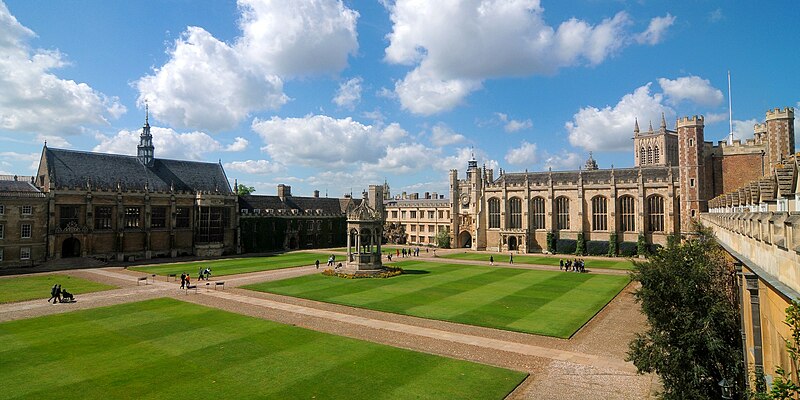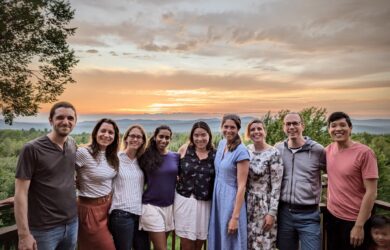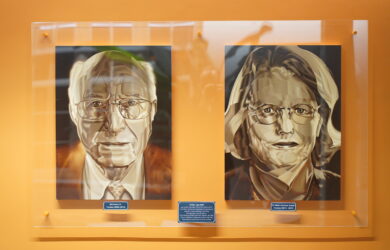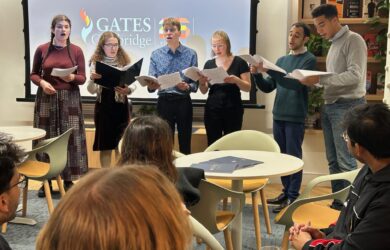
The first 26 scholars of the Class of 2024 has been announced and will start at Cambridge this autumn.
We know that these scholars – and those we announce in early April from other parts of the world – will flourish in the rich, international community at Cambridge and we trust that they will go on to have a significant impact in their various fields and more broadly, tackling the complex global challenges we face today.
Professor Eilis Ferran
Twenty-six of the most academically outstanding and socially committed US citizens have been selected to be part of the 2024 class of Gates Cambridge Scholars at the University of Cambridge.
The US Scholars-elect, who will take up their awards this October, are from a wide range of backgrounds. They come from 20 universities across the United States and beyond, including three institutions that have for the first time produced a Gates Cambridge Scholar [Monterey Peninsula College (California), Middle Tennessee State University (Tennessee) and SUNY Schenectady County Community College (NY)].
Nineteen are women, six are men and one would prefer not to specify. Thirteen will pursue PhDs while 13 will undertake one-year master’s degrees.
They include:
Elizabeth Appel who will do an MPhil in Engineering for Sustainable Development. She studied civil engineering at the University of Kansas where she was involved in research that investigated the relationship between socioeconomic vulnerability, historic redlining policies and modern urban flooding. Having gained experience at multiple infrastructure firms in Kansas City, she plans to use her MPhil coursework to guide her career as an engineer on projects that prioritise sustainability and provide people with the fundamental resources and services needed to engage with their communities. Elizabeth has demonstrated leadership skills in many areas, for instance, in roles as student chapter President of the American Society of Civil Engineers (student chapter) and student chapter Vice President of the Society of Women Engineers.
Sonia Fereidooni who will do a PhD in Digital Humanities and will be one of the first cohort of a new degree at Cambridge. She did her undergraduate and master’s studies in both computer science and sociology at the University of Washington. While there she played an interventionist and practical role in developing technical solutions to problems of state surveillance and raised significant funding to achieve her vision through a combination of research and development in state-of-the-art AI models and frameworks and her research in AI bias. For her PhD she hopes to research how to effectively legislate AI governance in protection of intersectional identities from the Global South, especially in the Middle East, North Africa and Central Asia. She says: “I hope to pursue fieldwork in critical areas that are most adversely affected by the recent accelerated developments of AI, and research how it is that AI can be universally-regulated to avoid such outcomes.”
Ishan Kalburge who will do a PhD in Engineering which will look at how the human brain forms internal representations of uncertainty. He hopes to develop computational models that emulate such representations in order to advance our understanding of human cognition in health and disease and pave the way for developing trustworthy and energy-efficient artificial intelligence. Ishan is also President of Johns Hopkins Biomedical Engineering Society. He says the initial motivation for his research is a personal one: “When my grandfather was diagnosed with Parkinson’s Disease, I was driven to deepen my understanding of human cognition to develop solutions that could help people like him,” he says.
Julia Weiss who will do a PhD in Plant Sciences on how tropical biodiversity will be impacted over the long-term by multiple Anthropogenic-induced stressors. She will do this through a project that will generate inference of species responses to selective logging and associated interactions with climate change over the long term. The aim is to provide critical information regarding the ecological value of selectively logged forests and to understand the long term resilience of species in an era of global climate change. Julia has substantial experience in environmental activism and policy, having worked for UN youth constituencies on global climate and biodiversity frameworks. She says: “For my PhD I will be studying avian communities in Borneo to unravel temporal changes within logged and pristine forests and assess how climate change might exacerbate the impacts of land degradation.”
Jonathan Salamon who will do a PhD in Music which will focus on Handel’s keyboard music and seek to adapt a pedagogy for recreating music in his style. A historical keyboardist with a passion for 18th-century music history and theory he researched the forgotten music of the Portuguese synagogue in Amsterdam as a Fulbright Scholar, and then told the story of the Dutch Jewish community through this music in the form of lecture-recitals. At Yale where he did his master’s, Jonathan helped to co-found the first LGBTQ affinity group at the School of Music. He says: “I aim to make repertoire from the past more accessible to audiences and students by highlighting common harmonic elements between the music of the early modern period and the present day.”
Sarah Miller who will do an MPhil in Clinical Neurosciences. Sarah received a Bachelor of Arts from Colgate University with a major in physics and minor in biology where she investigated superconducting circuits for neurocomputational modelling with applications to epilepsy. Over the summer vacations she conducted research in bioelectronics and nano-optics. Her MPhil will focus on developing Deuterium Metabolic Imaging (DMI) – a process which maps metabolism in 3D – as a viable clinical tool for neuroimaging. Sarah is also an inaugural Executive board member of Athlete Ally, a group that promotes LGBTQ+ equality in sports.
The 26 US Scholars-elect will study and research subjects ranging from how magma shapes human life to how to create the necessary infrastructure to bring robots to marginalised communities.
The prestigious postgraduate scholarship programme – which fully funds postgraduate study and research in any subject at the University of Cambridge – was established through a US$210 million donation to the University of Cambridge from the Bill & Melinda Gates Foundation in 2000; this remains the largest single donation to a UK university. Since the first class in 2001, Gates Cambridge has awarded 2,182 scholarships to scholars from 112 countries who represent more than 700 universities globally (more than 200 in the USA) and around 90 academic departments and all 31 Colleges at Cambridge.
In addition to outstanding academic achievement the programme places an emphasis on social leadership in its selection process. The programme’s aim is to create a global network of future leaders committed to improving the lives of others.
The US Scholars-elect will join around 50 Scholars from other parts of the world, who will be announced in early April. The full class of 2024 will join current Gates Cambridge Scholars in October to form a community of around 300 current Scholars in residence at the world-leading University of Cambridge.
Professor Eilis Ferran, Provost of the Gates Cambridge Trust, said: “I’m delighted to announce the US cohort of the Gates Cambridge class of 2024. These scholars, who have been selected by our expert Selection Panels, are a reflection of the mission of the Gates Cambridge Trust established through the Bill & Melinda Gates Foundation’s generous and historic gift to the University of Cambridge – to change the world for the better. We know that these scholars – and those we announce in early April from other parts of the world – will flourish in the rich, international community at Cambridge and we trust that they will go on to have a significant impact in their various fields and more broadly, tackling the complex global challenges we face today.”
*Full bios and photos of the Scholars-elect are available from our Directory page here.
*Picture credit of Trinity College: Cmglee and Wikipedia.












